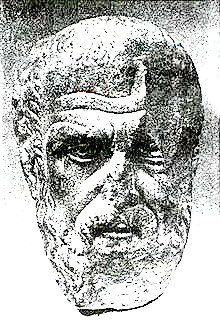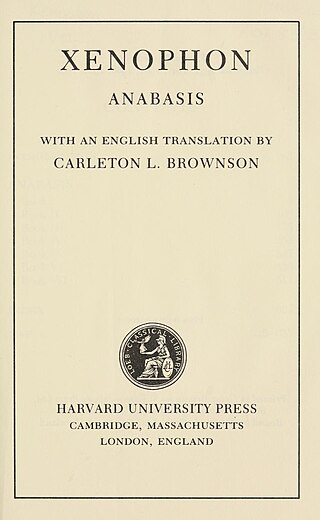Related Research Articles

Xenophon of Athens was a Greek military leader, philosopher, and historian. At the age of 30, he was elected as one of the leaders of the retreating Greek mercenaries, the Ten Thousand, who had been part of Cyrus the Younger's attempt to seize control of the Achaemenid Empire. As the military historian Theodore Ayrault Dodge wrote, "the centuries since have devised nothing to surpass the genius of this warrior". Xenophon established precedents for many logistical operations and was among the first to describe strategic flanking maneuvers and feints in combat.

Arrian of Nicomedia was a Greek historian, public servant, military commander, and philosopher of the Roman period.

Anabasis is the most famous work of the Ancient Greek professional soldier and writer Xenophon. It gives an account of the expedition of the Ten Thousand, an army of Greek mercenaries hired by Cyrus the Younger to help him seize the throne of Persia from his brother, Artaxerxes II, in 401 BC.

The Büyük Menderes River, is a river in southwestern Turkey. It rises in west central Turkey near Dinar before flowing west through the Büyük Menderes graben until reaching the Aegean Sea in the proximity of the ancient Ionian city Miletus. The river was well known for its sinuous, curving pattern, and gives its name to the common term used to describe these characteristic bends in rivers.

The Anabasis of Alexander was composed by Arrian of Nicomedia in the second century AD, most probably during the reign of Hadrian. The Anabasis is a history of the campaigns of Alexander the Great, specifically his conquest of the Persian Empire between 336 and 323 BC. Both the unusual title "Anabasis" and the work's seven-book structure reflect Arrian's emulation of the Greek historian Xenophon, whose own Anabasis in seven books concerned the earlier campaign "up-country" of Cyrus the Younger in 401 BC.

The Ten Thousand were a force of mercenary units, mainly Greeks, employed by Cyrus the Younger to attempt to wrest the throne of the Persian Empire from his brother, Artaxerxes II. Their march to the Battle of Cunaxa and back to Greece was recorded by Xenophon, one of their leaders, in his work Anabasis.

William Watson Goodwin was an American classical scholar. For many years he had been a professor of Greek at Harvard University.
In Greek mythology, Polydorus or Polydoros was a king of Thebes.

John Henry Wright was an American classical scholar born at Urumiah (Rezaieh), Persia. He earned his Bachelors (1873) and Masters (1876) at Dartmouth College, New Hampshire. After junior appointments in 1886 he joined Johns Hopkins as a professor of classical philology. In 1887, he became a professor of Greek at Harvard, where, from 1895 to 1908, he was also Dean of the Graduate School of Arts and Sciences.
Ophryneion or Ophrynium was an ancient Greek city in the northern Troad region of Anatolia. Its territory was bounded to the west by Rhoiteion and to the east by Dardanus. It was located about 1.5 km north-east of the village of Erenköy in Çanakkale Province, Turkey. The city was situated on the steep brow of a hill overlooking the Dardanelles, hence the origin of its Ancient Greek name ὀφρῦς (ophrus), meaning 'brow of a hill', 'crag'.
In Greek mythology, the name Chryse may refer to:
Tim Rood is a British classical scholar, specialising in Greek historiography and reception studies. He is Professor of Greek Literature at the University of Oxford and a fellow and tutor at St Hugh's College, Oxford. His research is principally concerned with the literary techniques of Herodotus, Thucydides, and Xenophon.

Lewis Richard Packard was an American scholar, best known for his work, ‘’Morality and Religion of the Greeks’’.

Helen Hazard Bacon was professor of classics at Barnard College. She was known in particular for her work on Greek tragedy, especially Aeschylus. Bacon was also well known for her work on classical themes in the poetry of Robert Frost and in the mythological writing of Edith Hamilton. Bacon was president of the American Philological Association in 1985.

Frazelia Campbell was an American classicist, linguist and teacher. She was featured in the "12 Black Classicists" travelling exhibition celebrating the achievements of African Americans working in Classical education.

Evangelinos Apostolides Sophocles was a professor of classics and Modern Greek at Harvard University, and lexicographer. He was born in Tsangarada, Thessaly, Ottoman Empire, and he died in Cambridge, Massachusetts. He was a fellow of the American Academy of Arts and Sciences and is considered to be a pioneer of Modern Greek studies.
Charles Farwell Edson Jr. (1905–1988) was an American scholar of Ancient History.
Helen H. Tanzer (1876–1961) was a researcher, translator and educator of classical texts. She brought Roman archaeology to her students and the public through her teaching and published translation of Latin literature. She was also dedicated to the embassy of Belgium, despite being an American, and was an honorary attaché and a member of the Belgian Legion of Honor. She was honored with the Chevalier Order of Leopold II.
Charles Forster Smith was an American classical philologist, who focused on the ancient Greek historian Thucydides.
Robert B. Strassler is a businessman, book editor, and unaffiliated scholar. He is best known for his work on the Landmark Ancient Histories series. Strassler's editions of classical texts, such as those by Herodotus, Thucydides, and Xenophon, have detailed annotations, maps, and appendices, to help readers better understand these ancient works.
References
- 1 2 3 4 5 W., J. R. (1917). "John Williams White". American Journal of Archaeology. 21 (2): 202–204. ISSN 0002-9114.
- 1 2 3 Gordon, Laura. "WHITE, John Williams". Database of Classical Scholars | Rutgers, The State University of New Jersey. Retrieved February 2, 2025.
- ↑ Gordon, Laura. "WHITE, John Williams". Database of Classical Scholars | Rutgers, The State University of New Jersey. Retrieved February 2, 2025.